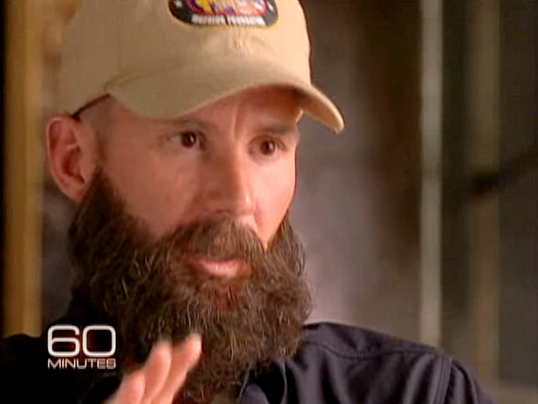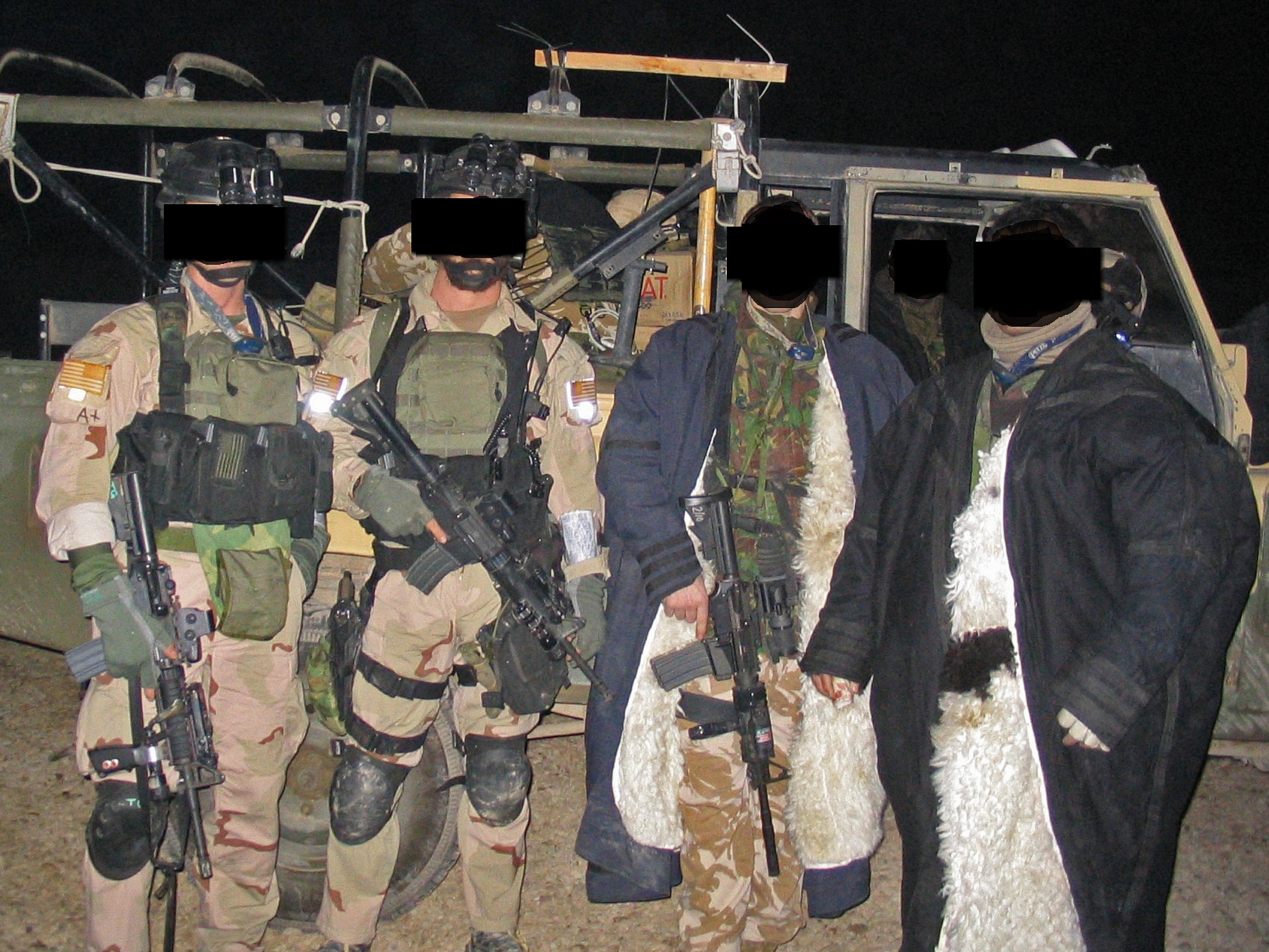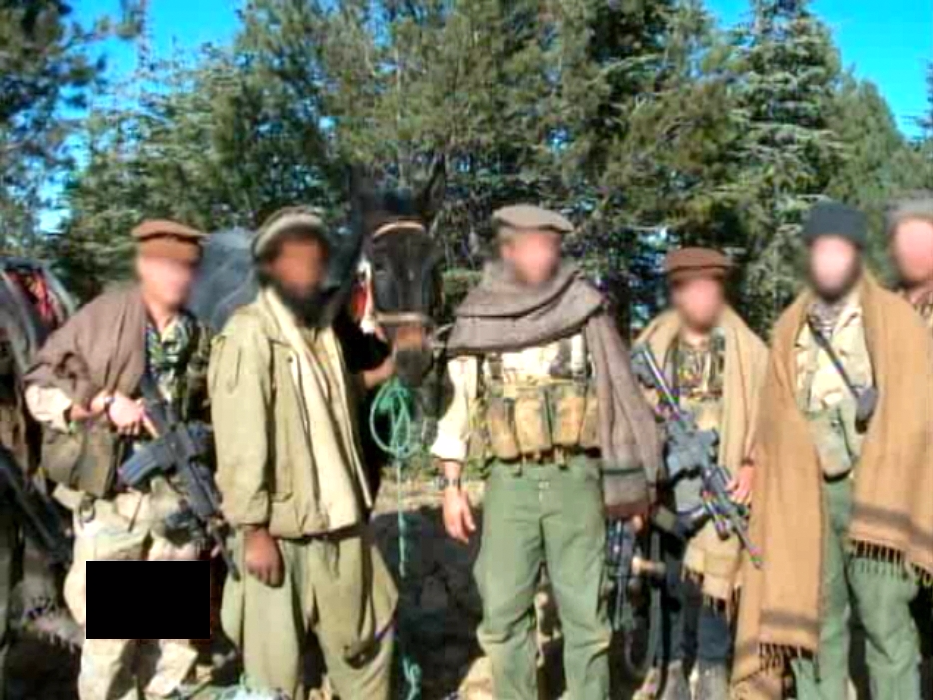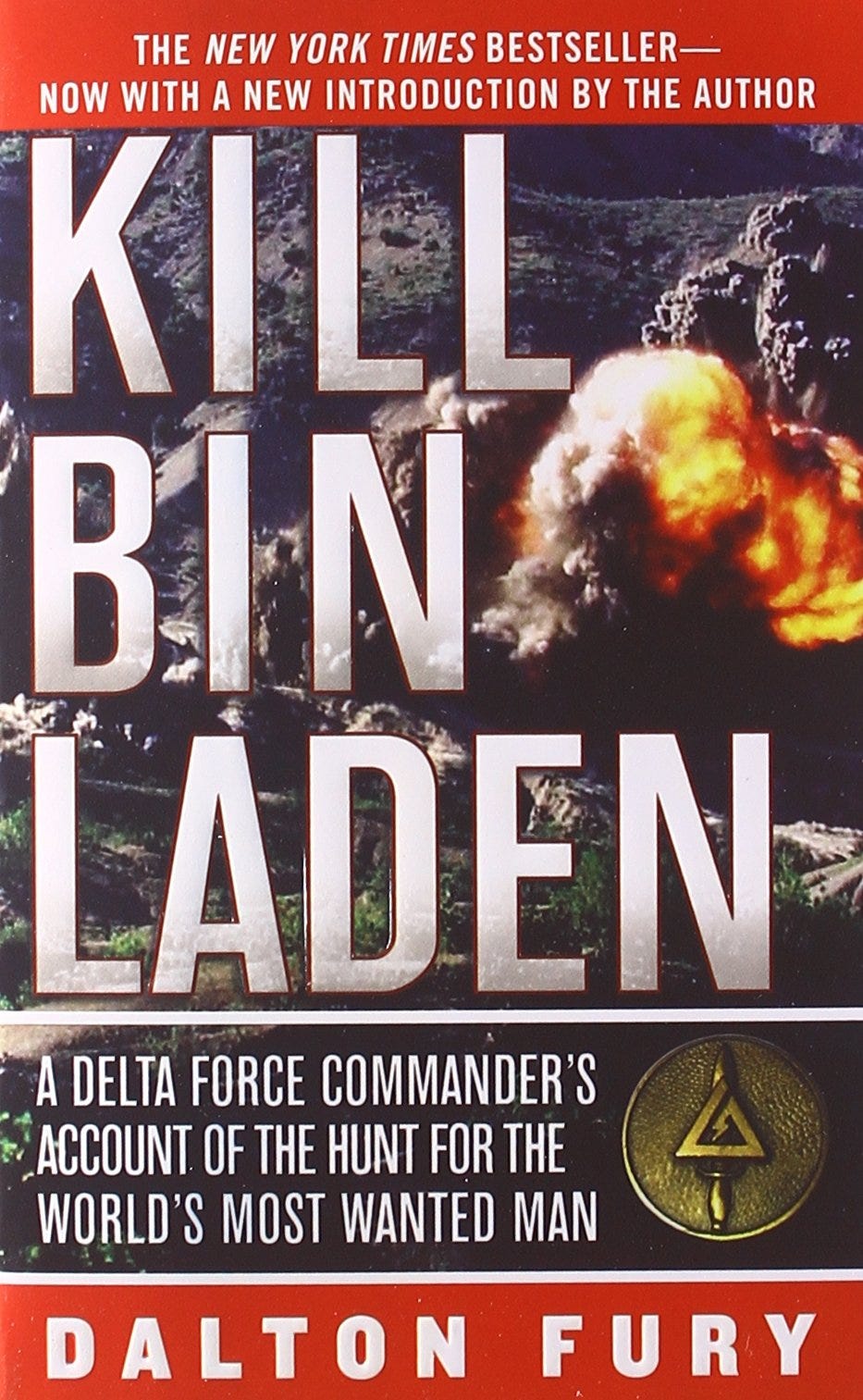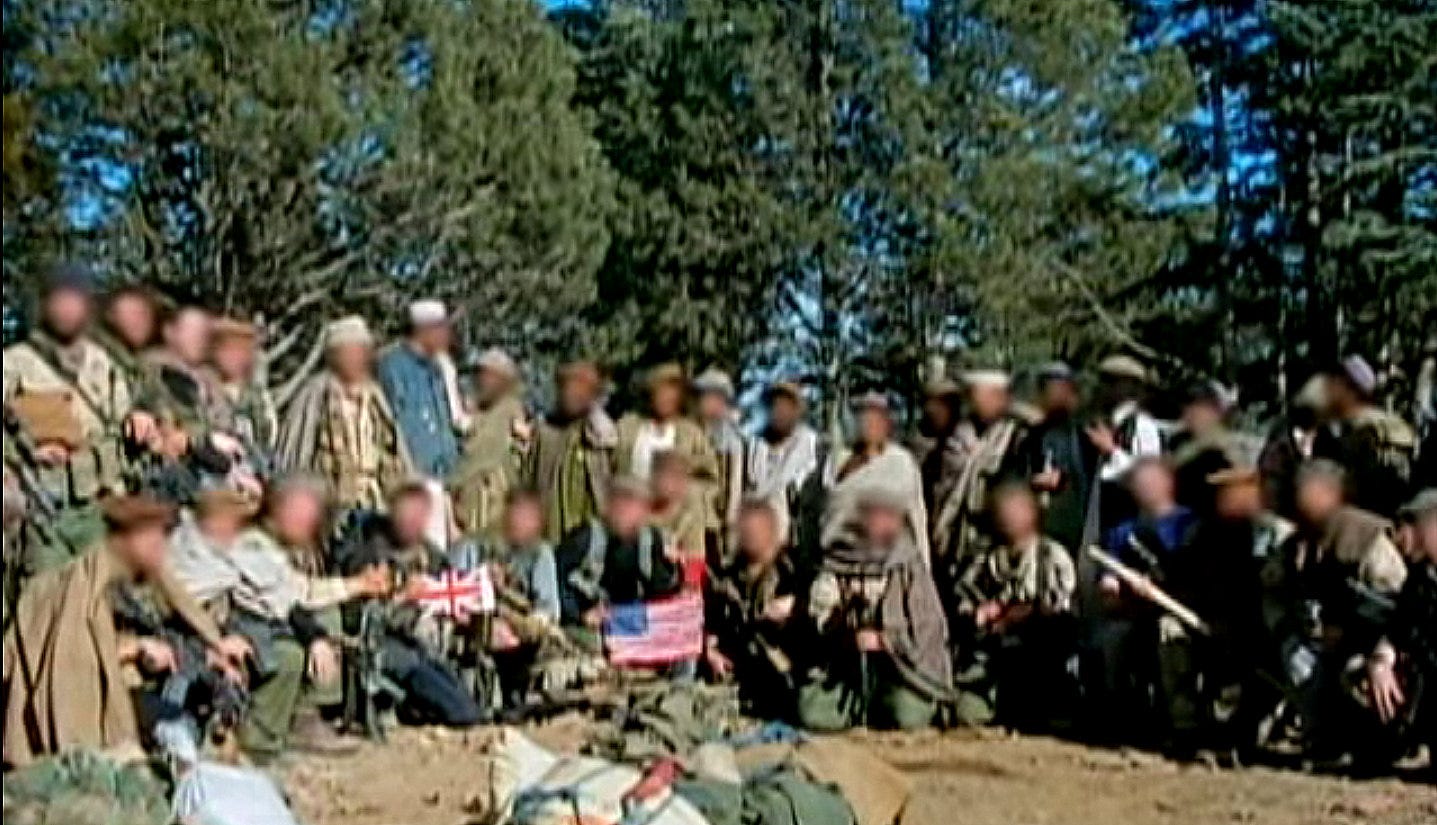Former Delta Force officer reveals 12 leadership lessons he learned in one of the US military's most elite forces
"60 Minutes"/CBS NewsFormer Delta Force commander Dalton Fury, a pseudonym, appeared on "60 Minutes" wearing prosthetics and colored contact lenses in 2008.
Dalton Fury spent more than 20 years in the US Army as a Ranger and then as a Delta Force operator.
Fury is the pseudonym he uses for his writing, since his time in Delta Force, one of the US's most secretive and elite forces, has required him to conceal his true identity.
He made one public appearance, in Hollywood-grade facial prosthetics and colored contact lenses,
on "60 Minutes" in 2008 to discuss his role leading the Delta Force mission in the 2001 Battle of Tora Bora intended to eliminate Osama bin Laden, as depicted in his New York Times bestseller, "
Kill Bin Laden."
Fury said he wrote the book to set the record straight and donated all profits to a veterans' organization. He has since made
a career of writing novels.
Fury sent us a collection of leadership lessons he learned in Delta Force and Rangers, which we've summarized below.
View As: One Page Slides
1. Play well with your team, but remain the alpha.
Fury says that you need to "play well with others," as they say, but as the leader of a team you need to embrace the role of being a model for your subordinates.
"Arrogance, in measured amounts and used prudently, actually benefits an organization," he writes. "Of course, you have to be able to back this up with results versus rhetoric."
2. Let things go.
In 1994, Fury and his fellow Rangers would take monthly visits to the Ft. Benning cemetery to pay respects to the Rangers who were killed in the 1993 Battle of Mogadishu. After several of these visits, now retired Lieutenant General Frank Kearney gathered his unit and told them that it was time to move on from their grief and frustration, and that the cemetery visits would stop.
"We had done what we could for those heroes, and it was time to honor them by physically and mentally preparing for the next action," Fury writes. "It was respectful, spot-on, and the right thing to do."
He says that this moment stuck with him, because it showed him that focusing on failures and disappointments held a team back.
3. Trust your instincts.
Courtesy of Dalton Fury.Delta Force operators in Afghanistan, their faces censored to protect their privacy.
There have been several moments in his military career, Fury says, where a leader's confident, quick decision-making meant the difference between either a massive failure or victory.
For example, in the 2002 Operation Anaconda in Afghanistan, the Army's plan was falling apart from the outset. Senior leaders on remote bases were recommending Delta Force retreat, according to Fury, and couldn't agree on a plan. Then the Delta Force commander in charge of the operation, Pete Blaber, contacted his leadership and gave them a concrete plan of action. It ended up a major victory.
4. Admit your mistakes with confidence.
Fury writes that the greatest military leaders take responsibility for all mistakes under their watch, regardless of how involved they were.
He explains how Joint Special Operations commander, and Delta Force commander before that, Bill Garrison wrote a short memo to President Bill Clinton in 1993 taking full responsibility for the disaster in Somalia.
"Nobody expected Garrison to shoulder the blame, but he did it anyway, and still to this day he is considered to be one of the finest leaders ever to command Delta Force," Fury writes.
5. Trust your subordinates.
"60 Minutes"/CBSDelta Force operatives disguised as Afghan civilians, their faces censored to conceal their identities.
Fury says that in the military, commanders establish relationships with officers that they can trust to act on their own and come through in a crisis.
For example, "Year after year, commander to commander, maverick warrior ... Jim 'Serpico' Reese, a stand-out Ranger and Delta officer, quite possibly would have made [Ulysses S.] Grant appear wanting when it came to working through chaos, calming nerves, and demanding the best out of subordinates."
6. Don't try to achieve perfection.
"How much information or intelligence does a special operations unit need before they launch a high-risk kill or capture mission?" Fury writes.
"I argue that very rarely will the intelligence picture be better than a 70% solution, and at that point action should be taken. Waiting for another 10%, or even 5%, only closes the window of opportunity faster as we wring our hands and stare at the live Reaper feed on kill TV."
7. Manage your own boss.
Fury writes that part of being an effective leader is knowing not only how to instill confidence in your subordinates, but in your superior.
He explains that there are times in special operations where plan A isn't going exactly as planned, and if the leadership in charge of the mission's commander gets nervous, the entire thing could turn into a disaster. It's why, Fury says, leaders need to assure their own leaders in advance that they are prepared for whatever unexpected situations arise.
8. Mitigate risk.
AmazonDalton donated all profits from his 2008 book to the Special Operations Warrior Foundation.
All high-performing teams operate in situations with a high level of risk, Fury says, but that doesn't mean that decisions should be gambles.
It is the leader's responsibility to "see the forest through the trees" and anticipate as many scenarios in a mission as possible, in order to always have a plan ready to go with the least risky choice available.
9. Be humble.
Fury says that in his special-operations career, he's seen some guys think they were "action heroes," and that there's the temptation to embrace this idea when you're put in charge of a group of these men. But it should be the opposite: When given a leadership position, it's time to exude confidence but refrain from bravado.
"And at that moment when you apply this secret, realizing you are not one of the action heroes — more Clark Kent than Superman — you have met the first standard for actually leading high-performance teams," Fury writes. "Not just in Delta Force, not just in SEAL Team Six, but in any industry, corporate big-boy, or ambitious startup."
10. Understand that your subordinates are responsible for your success.
The people you lead determine your success, Fury says, and both your boss and colleagues will recognize it.
"Just prior to taking command of an infantry rifle company, a former battalion commander of mine sent me a personal note: 'Now is the time to pay back all the people that got you where you are now, by ensuring their success,'" Fury writes. "I kept the note under the glass on my desk at work and read it literally every day."
11. Find people better than you.
"60 Minutes"/CBSThe Delta Force unit that served in the Battle of Tora Bora.
"Top shelf leaders seek out subject matter experts and designated performers," Fury says. Recognize that your position shouldn't require you to be exceptional in every task you're involved with, but rather require you to find, develop, and learn from the people who are.
Fury says that he remembers a Ranger from the early '90s who had a hobby of tinkering with computers on base. It soon became apparent that it was a waste to have him in combat, because his true talent was with technology, and that was where he was moved in order to shine.
12. Place prime importance on logic.
Fury says that one of the most significant challenges of being a special-operations commander is managing a unit of almost exclusively ambitious and aggressive personalities. The way around it is by leading from a position of logic, above all else.
He writes that "the leader needs to consistently reset the left and right limits of the problem, splice important pieces of each warrior's thoughts and opinions with the others, and apply consistent, repetitive context and shared purpose."
"When you need to get from A to B, and the Logic Train pulls into the station and everyone gets on, if you don't keep them on throughout the ride your force eventually becomes scattered, unorganized, vulnerable, and defeated.




